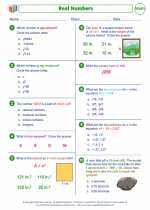Exponentiation
Exponentiation is a mathematical operation that involves raising a base number to a certain power, known as the exponent. The result of an exponentiation operation is the base number raised to the power of the exponent. The general form of an exponentiation operation is:
Properties of Exponentiation
Exponentiation has several important properties that are useful to understand:
- Product of Powers: When multiplying two numbers with the same base but different exponents, you can add the exponents together. This is expressed as:
- Quotient of Powers: When dividing two numbers with the same base but different exponents, you can subtract the exponents. This is expressed as:
- Power of a Power: When raising a power to another power, you can multiply the exponents together. This is expressed as:
- Zero Exponent: Any non-zero base raised to the power of 0 is equal to 1. This is expressed as:
- Negative Exponents: A base raised to a negative exponent is equal to 1 divided by the base raised to the positive exponent. This is expressed as:
am * an = am+n
am / an = am-n
(am)n = am*n
a0 = 1
a-n = 1 / an
Examples
Let's go through some examples to illustrate the properties of exponentiation:
23 * 25 = 28 (since 3+5 = 8)
57 / 54 = 53 (since 7-4 = 3)
(42)3 = 46 (since 2*3 = 6)
Example 4: Zero Exponent
60 = 1
Example 5: Negative Exponents
3-2 = 1 / 32 = 1/9
Study Guide
When studying exponentiation, it's important to practice applying the properties of exponentiation to different numerical examples. Additionally, understanding the concept of exponentiation in real-world contexts can be helpful in solidifying your understanding of the topic.
Here are some key study tips for mastering exponentiation:
- Practice simplifying expressions involving exponentiation using the properties of exponentiation.
- Work on word problems that involve exponentiation to see how it can be applied in practical situations.
- Create flashcards to memorize the properties of exponentiation and key exponentiation rules.
- Use online resources and interactive tools to reinforce your understanding of exponentiation through practice exercises and quizzes.
By mastering exponentiation and its properties, you'll develop a strong foundation in algebra and be better prepared for more advanced mathematical concepts.
.◂Math Worksheets and Study Guides Eighth Grade. Real numbers
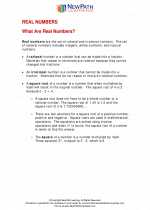
 Worksheet/Answer key
Worksheet/Answer key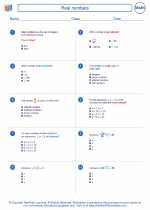
 Worksheet/Answer key
Worksheet/Answer key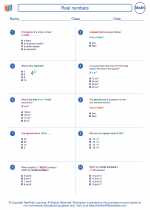
 Worksheet/Answer key
Worksheet/Answer key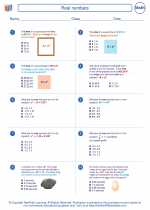
 Worksheet/Answer key
Worksheet/Answer key